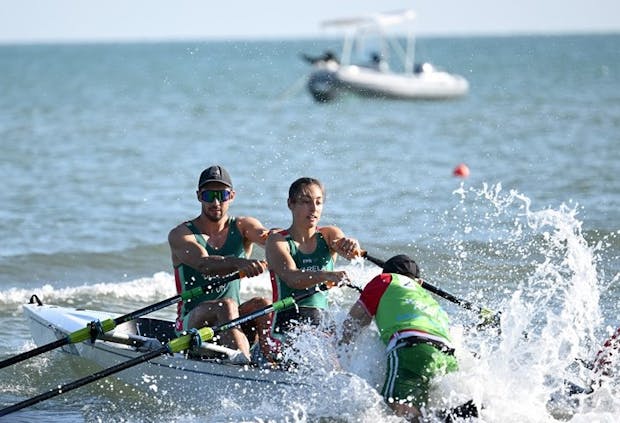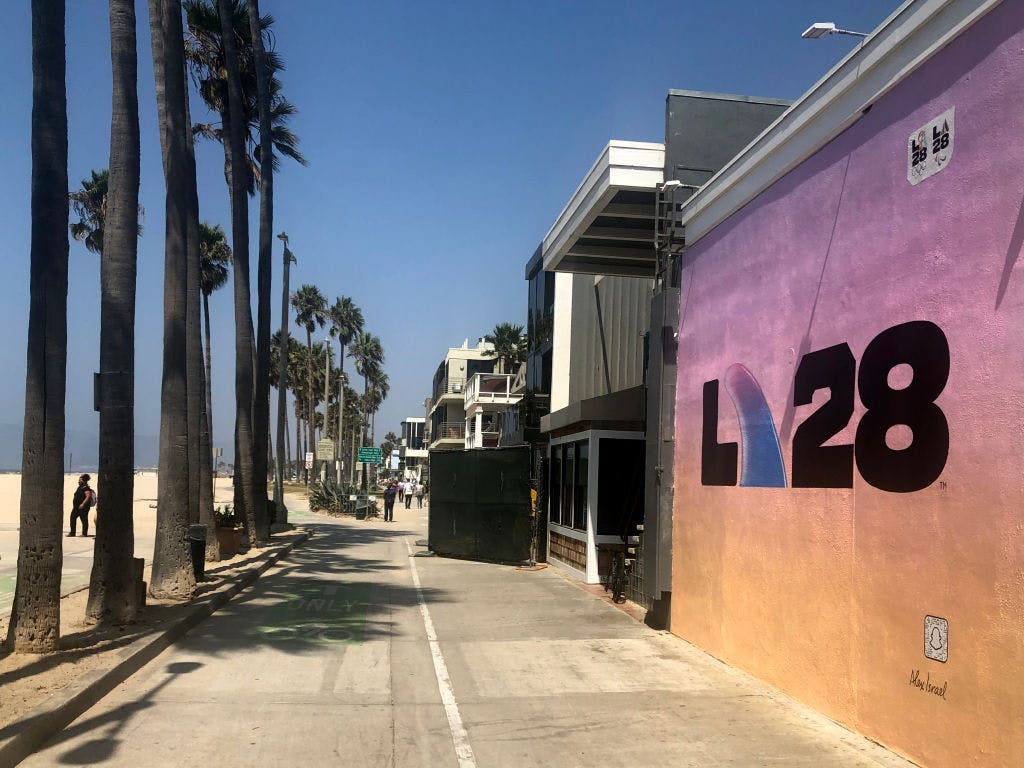
Friday 13th. Unlucky for some. Not for World Rowing and its quest to get its newest, fast-paced discipline into the highest echelons of world sport.
That October Friday at the International Olympic Committee session in Mumbai, India, Beach Sprint Rowing was the only one of 16 disciplines proposed by several different international federations to be included on the programme for the Los Angeles 2028 Olympic Games.
For World Rowing it was the culmination of a journey that began by accident, almost, back in 2011 when discussions took place internally as to how to make coastal rowing – traditionally staged between 4-and-6km – an exciting and compelling discipline for both participants and spectators.
The morning after the World Rowing Coastal Championships had finished in Bari, Italy, a number of athletes were invited to a fun regatta off the beach; a mass start with a 2km row and a beach run.
Beach Sprint Rowing was born.
Fast forward 12 years, and plans are advancing for a franchise-based league to launch in 2026 or 2027, as exclusively revealed by SportBusiness earlier this week, with World Rowing in the early stages of establishing a joint venture (JV) with Hydrow Inc, the provider of connected indoor rowing machines.
The JV is the first demonstrable outcome of World Rowing’s ‘Strategic Commercial Partnership/Investment Project’, launched in 2022 and after rival summer international federations such as volleyball’s FIVB attracted private equity investment. It is designed to support the development of a framework for commercial growth and external investment into the sport across all disciplines.
While Hydrow appears to have sewn up the Beach Sprint Franchise League, World Rowing remains open for investment as it looks to grow the revenue pot across its three disciplines: classic rowing, coastal/beach rowing and indoor/connected rowing.
In 2022, World Rowing reported total income of CHF7.45m (€7.7m/$8.3m), with profit coming in at a little over CHF850,000.
Like many Olympic international federations, World Rowing is heavily reliant on Games-related income. IOC funding of CHF4m represented the biggest slice of 2022 income, followed by events management (CHF1.49m) and events marketing and TV rights (CHF1.31m).
The sport currently sits in Group C of the International Olympics Committee’s (IOC) revenue standings, along with badminton, judo, shooting, table tennis, archery and weightlifting, which means it stands to receive CHF16.05m over the course of the 2021-24 quadrennial off the back of Tokyo 2020.
The current bands are measured by six weighted criteria split into 18 indicators laid out by the IOC. Television and internet are the two most heavily-weighted criteria at 40 per cent and 20 per cent, respectively. These criteria consider maximum TV audience, viewing hours and social media views. Elsewhere, the number of press articles and the favourability and tone of those articles is also a factor, while “general public, spectators and universality” also play a role in determining the groupings.
It is easy to see how a fast-paced, short-format discipline with obvious peril would perform well against such criteria.

Adapt or die
Vincent Gaillard, executive director of World Rowing, tells SportBusiness that when faced with the predicament of losing ground and potentially revenue from the Olympics, the federation had to get creative.
“The sprint format has been out there without really being pushed very hard and what effectively accelerated the whole process was the IOC questioning the value of lightweight rowing as a category at the Olympics. Then it became, how do we react to the concern that the IOC no longer sees the relevance of lightweights?,” he says.
“We needed to be more proactive in terms of offering an alternative as opposed to just losing the quota. Beach Sprint will add real value to the games. First of all LA is a beach city, so it fits with the culture of the games.
“But for the IOC it’s a very low cost, low complexity addition to the games, which is a massive factor. It’s very easy to broadcast from a production point of view. Classic rowing is a 2,000 metre long course with up to eight boats, which often means you need a lot of boats with cameras along the course. With the beach sprint format, the rowers run from the beach on the start line for maybe 50, 70 meters to the boat, it’s 250m out to sea, turn around a buoy and back.
“You can see everything from the shore, so effectively all you need is a few cameras and drones. Then there’s the drama that you don’t necessarily think of with traditional rowing, because now you have waves, choppy waters, you have currents, so you need strong navigation skills. There’ll be boats capsizing, it’s head-to-head racing. There’s an added excitement level.”
As yet, there is no known direct revenue from the IOC from its inclusion in Los Angeles. But there’s already the knock-on effect of being part of the future games’ programme from commercial and event hosting contracts.
Gaillard explains: “Our World Championships will come with elevated, operational and financial requirements, because it’s now an Olympic discipline. Naturally because of the exposure the sport is going to get, we’re going to be bringing in more sponsorship revenue, more media rights revenue from whatever broadcast deals we strike. And then there’s the creation of the franchise league. So there are many different elements that come out of that one IOC decision.”
World Rowing and Hydrow are still in the early stages of planning as they look to develop what a franchise league will look like. Everything from the number of participants, cost of a franchise and make up of teams is still being discussed.
As is the commercial model, hence the need for a joint venture, rather than run the competition within the confines of the governing body.
“We’re trying to make it more commercially-oriented, certainly perhaps more than what we have been accustomed to in the past. That means it’s going to be developed with a different governance, which is why we need that investor,” Gaillard notes.
“Effectively that league initiative is only being discussed with Hydrow.”
Investors form an orderly queue
Other opportunities await would-be investors in World Rowing’s other disciplines.
Indoor rowing is well-covered by Concept2, the indoor rowing manufacturer, whose products are used by professional rowers for training and has helped bring the sport, and World Rowing, into the digital age.
In 2020, World Rowing and Concept2 teamed up in a sponsorship agreement, with the brand having been the presenting sponsor of the World Rowing Indoor Championships since 2021.
For the second time in World Rowing’s history, the 2024 Championships in late February will be staged as a hybrid event: rowers can participate in-person at the O2 Universum Hall in Prague, or ‘virtually’ in real time on their Concept2 ergometers. They will be connected via the internet to the same central timing and results system as for those in the venue.
Last year, World Rowing sent out a document titled, ‘Redefine the Status Row’, that outlined the federation’s plans to bring in investment across the board. It continues to draw the interest of private equity firms, sovereign wealth funds, traditional sports marketing agencies and rowing-specific companies, like Hydrow.
Gaillard joined World Rowing two years ago after six years as chief executive of European Professional Club Rugby, during which time he witnessed private equity fund CVC’s numerous investments in rugby union.
It’s not an experience he is keen to replicate in rowing.
He explains: “It’s vital we generate new revenues so we can best serve the sport. It’s as simple as that. The cost of sports governance, the complexity of it, whether it is safe, everything around the business is becoming so complicated and so time-consuming and resource intensive that we have to generate new revenues. We have to diversify revenues away from the Olympics. So how do we do that?
We’re not in the short-term thinking because we have assets to create. The Olympics with beach sprint is five years away. We’re not a turnkey investment solution for private equity to come into it for five or seven years. We’re in it for the long-term and therefore that excludes a lot of potential investors.
Vincent Gaillard, executive director, World Rowing.
“My personal view on it, and by the way my view has been partly impacted by the rugby experience with CVC, is I do not believe private equity is suitable for us for a number of reasons. The reason why I would prefer to partner with a Hydrow, as an example, than with a random private equity is because they have other reasons to be with us than just the money. And it’s potentially more long-term by definition than any private equity fund would offer. We’re not in the short-term thinking because we have assets to create. The Olympics with beach sprint is five years away. We’re not a turnkey investment solution for private equity to come into it for five or seven years.
“We’re in it for the long-term and therefore that excludes a lot of potential investors. But for Hydrow, this seems to work for them. There are others too. We think the right sovereign wealth would work, one that would like to invest in the development of a clean sport for the long term. It’s about soft power, it’s about reputation as opposed to just a quick return. It’s probably not Qatar or Saudi Arabia, but could it be a smaller Emirate. So sovereign wealth is one avenue which we’re going to explore.”
Whatever investment World Rowing takes on, Gaillard is adamant the federation will not cede control of its competitions.
“But in all circumstances, we will keep control of the sport. If you take that Hydrow joint venture, be clear, we control the sport and we define what that means under any circumstance. On the event itself, what we will do is outsource or delegate the commercial business to people that have the skills. Even if it wanted to, I can’t build an army of commercial [staff] in Lausanne, it makes no sense. Our job remains to govern the sport. That’s where the joint venture comes in. It allows the operation to be sufficiently separated from the governance of the sport.”
Calendar changes coming
At its 2023 congress in Belgrade, on the sidelines of the World Rowing Championships in early September, the Strategic Event and Calendar Review was officially launched. Gaillard says difficult questions will be asked, and no stone will be left unturned.
Consideration will be given as to whether the World Championships are too long, with too many boat categories, and what can be done to ensure the three World Cup events each year attract the best rowers from around the world.
New formats and new distances will also be discussed.
The calendar review is expected to be completed in 2025. It is largely an internal piece of work, but experts from broadcasters, brands and agencies will be invited to input into the plans to make sure the sport stays relevant, attractive, sustainable and commercially viable.

“There are a million things we can do better around our World Championships. How can we improve the broadcast? Do we put cameras on boats? Use more drones? We don’t do much hospitality right now, but we absolutely should. Then there’s the question of whether we should we be in betting? It’s been a taboo subject,“ Gaillard says.
“There’s all these things that we need to consider to ultimately make sure that we put more kids into more boats in the future. The sport is still seen as quite conservative, hard to access, because people see Cambridge versus Oxford [the University Boat Race] once a year. Or the Henley Royal Regatta. It’s an amazing event, it’s packed out every year, but it’s not who we are. We want the sport to be accessible and that’s where something like indoor rowing comes in.
“Indoor rowing attracts a fitness crowd for instance, while coastal rowing is fundamental for us also in terms of universality in the sense that it will give access to rowing to countries or islands in the Caribbean or in Oceania that will never have access to a 2,000 metre course or river.”
He adds: “I wouldn’t say we feel threatened, but the IOC’s Olympics lightweights concern was a clear message: you’ve got to stay relevant and make sure that the audience keeps growing. That’s what we’re focused on now.”